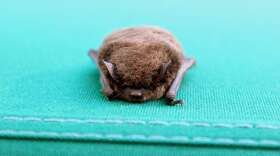-
It can be hard to imagine cows eating seaweed. But that could be one of the solutions to reduce methane emissions from cattle farming.
-
Climate change is bleak, it’s accelerating and it’s affecting lives around the globe — but it’s not too late to prevent the worst, according to a report led by Oregon State University researchers that’s drawing notice from around the world.
-
The wolves kept other species in check, like deer and elk, and maintained a healthy environment.
-
A recent report out of Oregon State University paints a picture of how ocean oxygen levels have decreased in the Pacific Northwest over the years.
-
The estimated value of Oregon farmland has skyrocketed in recent years, outpacing averages nationwide and leading to concerns about affordability for the next generation of farmers.
-
Wave energy experts from Oregon State University and Cal Poly Humboldt will contribute to research, public information around marine ecosystem impacts.
-
Machine learning algorithms are helping researchers detect the calls of marbled murrelets among millions of hours of audio recordings collected from Oregon and Washington forests.
-
Researchers at Oregon State University say new discoveries about how some Chinook salmon breed could help guide conservation efforts.
-
During the summer of 2021, half of coastal waters from northern California to the Canadian border had oxygen levels too low to support marine life.
-
An Oregon State University study has found climate change has led to an $11 billion decrease in the value of privately-owned West Coast forests over the last 20 years.
-
Researchers with Oregon State University aim to test about 1,600 wild animals for SARS-CoV-2, the virus that causes COVID-19.
-
A team of Oregon State University researchers were recently awarded $2.5 million to study the attitudes and feelings coastal residents have about potential offshore wind energy projects.
-
Instagram and other photo-sharing apps have been blamed for overcrowding on public lands. But research out of Oregon State University suggests social media isn’t a huge driver of visitation.
-
The U.S. West Coast produces over 90% of America’s wine, but the region is also prone to wildfires — a combustible combination that spelled disaster for the industry in 2020 and one that scientists are scrambling to neutralize.















